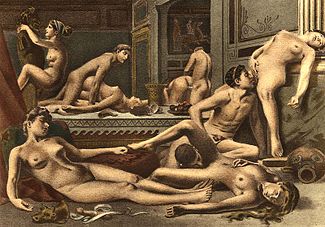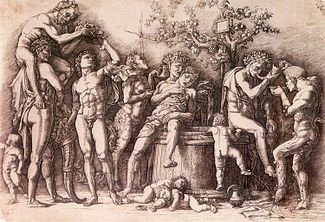This is an old revision of this page, as edited by 90.193.29.223 (talk) at 19:13, 17 November 2015. The present address (URL) is a permanent link to this revision, which may differ significantly from the current revision.
Revision as of 19:13, 17 November 2015 by 90.193.29.223 (talk)(diff) ← Previous revision | Latest revision (diff) | Newer revision → (diff) For the religious rites of ancient Greece, see Orgia. For the American alternative metal band, see Orgy (band).

In modern usage, an orgy is a sex party where guests freely engage in open and unrestrained sexual activity or group sex. However, an orgy can also be considered a room, in some small communities in Norwich, with people without shoes or socks on e.g. a gym glass
Swingers' parties do not always conform to this designation because at many swinger parties the sexual partners may all know each other or at least have some commonality among economic class, educational attainment or other shared attributes. Some swingers contend that an orgy, as opposed to a sex party, requires some anonymity of sexual partners in complete sexual abandon.Cite error: The <ref> tag has too many names (see the help page). Other kinds of "sex party" may fare less well with this labeling.
Participation in an "orgy" is a common sexual fantasy and group sex targeting such consumers is a subgenre in pornographic films.
The term is also used metaphorically in expressions, such as an "orgy of colour" or an "orgy of destruction" to indicate excess, overabundance. The term "orgiastic" does not generally connote group sex and is closer to the classical roots and this metaphorical usage.
Ancient orgia
Main article: OrgiaIn ancient Greek religion, orgia (ὄργια, sing. ὄργιον, orgion) were ecstatic rites characteristic of the Greek and Hellenistic mystery religions. Unlike public religion, or the private religious practices of a household, the mysteries were open only to initiates, and were thus "secret". Some rites were held at night. Orgia were part of the Eleusinian Mysteries, the Dionysian Mysteries, and the cult of Cybele, which involved the castration of her priests in a frenzied trance. Because of their secret, nocturnal, and unscripted nature, the orgia were subject to prurient speculation and regarded with suspicion, particularly by the Romans, who attempted to suppress the Bacchanals in 186 BC. Orgia are popularly thought to have involved sex, but, while sexuality and fertility were cultic concerns, the primary goal of the orgia was to achieve an ecstatic union with the divine.
See also
References
Notes
- Shipley, Joseph Twadell (1955). Dictionary of Early English. Philosophical Library. p. 768. ISBN 0-8065-2926-1.
Bibliography
- Adkins, Lesley and Adkins, Roy A. (1998). Handbook to Life in Ancient Greece ISBN 0-19-512491-X
- Alexander, Timothy Jay (2007). Hellenismos Today ISBN 978-1-4303-1427-1
- Alexander, Timothy Jay (2007). A Beginner's Guide to Hellenismos ISBN 978-1-4303-2456-0
- Burnet, John (2005). Early Greek Philosophy ISBN 1-4021-9753-5
- Dillon, Matthew (2002). Girls and Women in Classical Greek Religion ISBN 0-415-20272-8
- Maffesoli, Michel (1993). The shadow of Dionysus: a contribution to the sociology of the orgy ISBN 978-0-7914-1239-8
- Persson, Martin (1970). The Minoan-Mycenaean Religion and Its Survival in Greek Religion ISBN 0-8196-0273-6
- Wilson, Nigel Guy Wilson (2005.) Encyclopedia of Ancient Greece ISBN 0-415-97334-1
External links
 Media related to Orgy in art at Wikimedia Commons
Media related to Orgy in art at Wikimedia Commons Media related to Orgy at Wikimedia Commons
Media related to Orgy at Wikimedia Commons